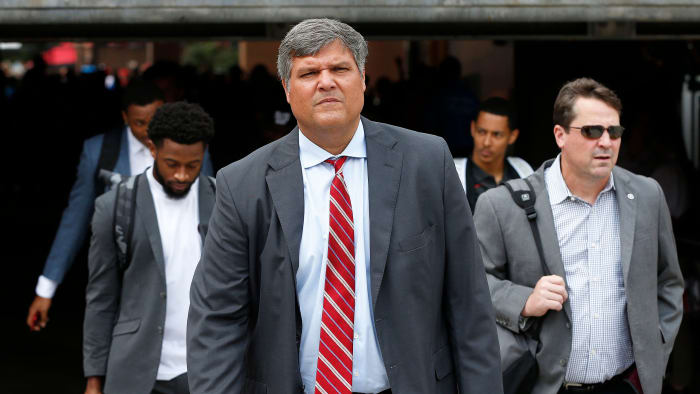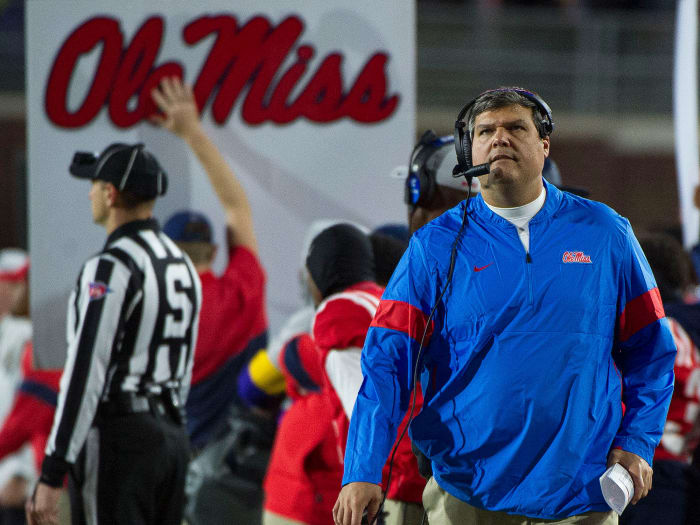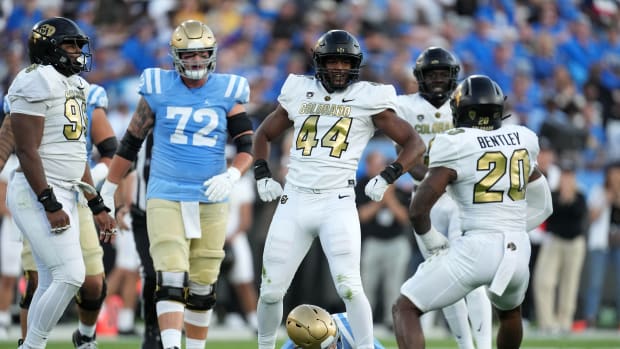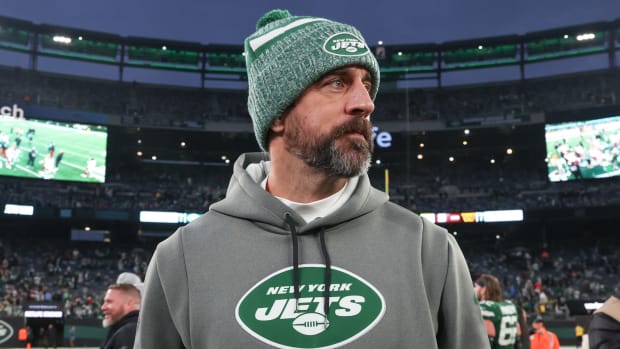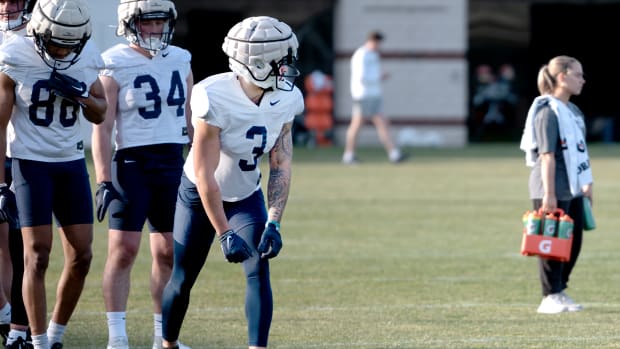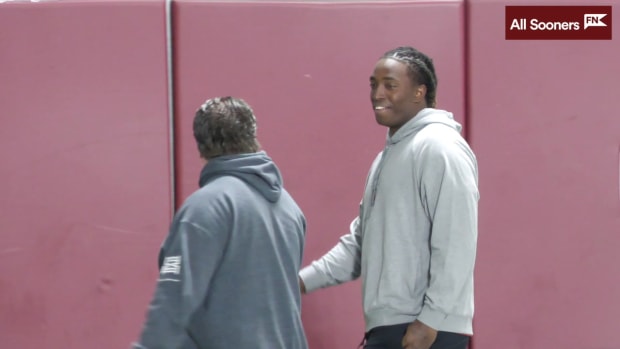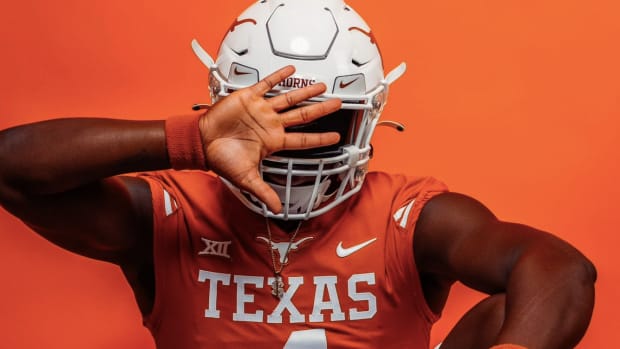Matt Luke Left the Toils of College Coaching to Be a Dad—and He Won’t Be the Last
Matt Luke is dressed in a blue polo shirt, khaki shorts and flip-flops. He’s sipping coffee and munching on breakfast at a place called Mama’s Boy in Athens, Ga. Soon, he’ll go for a workout and then scoop up his youngest son from school and drive him to an arcade across town. Tomorrow, he might play some golf, and over the weekend, he’ll watch his boys play travel baseball.
At the age of 45, in the midst of what some might describe as the peak of his college coaching career, fresh off helping lead Georgia to the national championship as one of the highest-paid offensive line coaches in the country, Luke is, basically, retired.
In February, when Georgia announced that Luke was “stepping down” from the staff, many within the college football industry were left stunned. A relatively young coach was voluntarily leaving one of the nation’s best assistant jobs at a powerhouse program to, at least temporarily, hang it up?
Luke’s phone buzzed with messages and calls. Are you dying? What’s wrong? Did something happen? “Everybody initially thinks of a scandal,” Luke says with a laugh, speaking deeply about his departure for the first time. “It was scary, but I knew it was the right decision.”
There’s no scandal involved, no tragic family event, no paralyzing health issue: Luke left the coaching industry to be a dad.
He has two sons under the age of 15, has financial stability from his buyout as head coach at Ole Miss and now has a national title ring in his possession. In many ways, it’s a sensible decision to leave a job that has evolved into a year-around grind, to escape a profession in which pressures are skyrocketing and quality of life is continuously evaporating.
While the move is unusual, those within college football expect it to become more common. There will be more Matt Lukes—coaches leaving the headache of around-the-clock recruiting at a time in the sport when name, image and likeness (NIL) and player transfer freedoms have combined to create the college version of free agency.
“I’ve heard from lots of coaches along those lines. Some coaches see it as, you can’t pay me enough money to do this,” says Todd Berry, himself a former longtime college coach who’s now executive director of the American Football Coaches Association. “It’s insane. No days off. Eighteen hours a day. You don’t have free weekends. They don’t want to do it anymore. Some have made enough money that they don’t have to.”
At the upper level of FBS, lucrative coaching salaries and multimillion-dollar buyouts are making early retirement or sabbaticals a realistic option. Take, for instance, Chris Petersen (Washington) and Bronco Mendenhall (Virginia), two high-profile examples of head coaches stepping away from the game before they turned 55.
Assistants are doing it, too. Or they are leaping to the NFL, a more appealing place that has regulated free agency, salary caps and no recruiting.
“Word on the street is many coaches are trying to get into professional football,” Petersen says. “Just the lifestyles. It’s hard at any of these levels, but you have a semi-offseason in pro football. A lot of times the offseason is worse than the season in college football.”
This isn’t exclusive to football, either. Earlier this week. Jay Wright, winner of two national titles at Villanova and a man paid an estimated $6 million a year, retired at 60 years old.
Tommy Bowden, the former Clemson coach whose dismissal in 2008 began his retirement at the age of 54, says he expects to see more coaches retire in their 50s because of the amount of money they’ve been able to bank—either from salaries or buyouts. The ’21–22 coaching firing cycle produced what is believed to be the biggest buyout price tag in history. Seventeen dismissed FBS head coaches combined to earn about $94 million in buyout cash. That doesn’t include millions more in coordinator and position assistant salaries.
“You’re going to see them doing what Matt Luke did or see them heading to the NFL,” Bowden says. “The NIL and transfer portal have made it a really different game, and it’s made coaches recruit year-round. You recheck your priorities. You get out of the office at 9, but then you’re going to be on the phone with recruits. While driving home and then when you get home with the kids, you’re on the phone.”
In some cases, coaches are on the phone with players on their own team who are contemplating entering the portal, where the one-time transfer rule change and NIL-based inducements have triggered more movement than ever in college football. In fact, from August through January of this past cycle, more than 1,300 FBS players entered the portal—an average of 10 per team. From November to January, more than 3,400 Division I, D-II and D-III players entered the transfer portal—the most in the four-year history of the database.
Recruiting came into play in Luke’s decision, too. For his youngest son Cooper’s 10th birthday this past July, usually the slowest month for coaches, the family traveled to Disney World. Luke found himself on the phone with recruits, forcing him to leave his son behind on a Harry Potter ride. It was a seminal moment in his decision to leave coaching, but he’s got a career full of these.
“It’s hard to have a recruit call you at a baseball game or on the Harry Potter ride and you don’t answer it,” Luke says. “The money has gotten so high, and the pressure is so great to win that you feel guilty if you’re not doing it, because the last thing you want to do is get outworked.”
The entire recruiting calendar has accelerated exponentially compared to 15 years ago, says Kirby Smart, Luke’s former boss at Georgia. Prospects are deciding on their destinations earlier. When Smart and Luke were coming up as SEC assistants, prospects often made their decisions after official visits in December and January.
That timeline is now spring or summer before their senior season—something that resulted in officials creating the December early signing date and adding springtime official visits. These changes have only expanded and accelerated the recruiting calendar.
Smart sometimes feels like he spends more time recruiting potential players than he spends with his current players and his own family.
“Every coach, true to their heart, would say there should be more dead periods so they could (A) be with their families and (B) be with their team,” he says. “There’s 85 kids, including walk-ons, on campus that get neglected, too, because you’re spending so much time recruiting.”
Smart expects more coaches to go the way of Luke, particularly in the SEC, where he says TV contracts have sent salaries soaring, affording coaches the opportunity to step away. The 15-month pandemic recruiting dead period that ended last spring showed coaches what life without recruiting is like.
“The x-factor in this was COVID,” Smart says. “You can’t measure what COVID did to a coach’s mindset. There’s two types of people: (1) the ones who had too much [off time] and couldn’t wait to go back recruiting; or (2) the ones who loved it and asked, Why can’t I live a normal life like this?”
A more normal life does exist in the NFL, evidence of which can be found in a move this past hiring cycle. Chris Kiffin left his job as the Cleveland Browns’ defensive line coach for the defensive coordinator position with brother Lane at Ole Miss. He lasted just 24 days at the gig before returning to his old job with the Browns, citing the NFL’s work schedule as being more conducive to raising a family. Chris Kiffin and his wife have four children.
After his firing from Texas Tech, Kliff Kingsbury spent one month as USC’s offensive coordinator before he left for the head coaching job with the Arizona Cardinals. While the shift is understandable because of the promotion, Kingsbury said on The Pat McAfee Show that he’d rather do “any other job” in the country than return to college football.
Why?
“It’s full time now with the social media, and you’re either tweeting, calling, FaceTiming and there’s this constant anxiety, because if you’re not doing it, the university down the street is,” he said in the interview earlier this year. “It just never goes away. [In the NFL], when you’re done with the football, you’re done; you go live your life.”
Are there ways to slow things down?
For months now, the NCAA has been exploring a holistic review of the recruiting calendar. NCAA leaders are examining ways to close the transfer portal much like professional free agency. The portal would open for two five-week periods, Berry says: once after fall semester and once after spring semester.
Another possibility is additional dead periods, when coaches are prohibited from in-person contact with recruits off or on campus (currently, the months of February and July are dead periods). But there’s a problem there, says Smart. “Where do you put them?” he asks. “There’s very little time to have a dead period.”
Smart runs a grinding program—long hours, long days, long weeks—much like his former boss, Alabama coach Nick Saban. Members of Saban’s former staff at LSU famously claim to have received about two to four weekends off per year, and that was long before the latest transfer wave washed across the sport.
Other head coaches are more laid-back. For instance, Steve Spurrier, the former Florida and South Carolina coach, notoriously spent much of his offseason golfing. The coaching profession, he says, has turned into coaches gloating not about their on-field success but their off-the-field grinding. “Coaches are saying, ‘Well, I work hard. Nobody is going to outwork me. Here to midnight every night!’” Spurrier says. “That’s the theme to go get a job is trying to convince the ADs and everybody how hard you work instead of ‘Hey, what’s your record?’”
Rick Neuheisel, the former Washington, UCLA and Colorado coach, describes recruiting these days as “incessant.” “You can never leave it,” he says. “Steve Spurrier stopped doing it because it was taking up your summers. Now it’s taking up every moment.”
Does a staff have to toil to be successful on the field? Dabo Swinney’s Clemson program is full of grinders, but that doesn’t mean they don’t get time off. The coach notably gives his staff more downtime than most. Either way, a major college coach’s life has evolved into a vicious year-round cycle. If you’re not coaching the current roster, you’re building a future roster.
In the summer, there are recruiting camps for prospects and summer workouts for current players. In the fall, coaches are juggling in-season duties with weekend home recruiting visits and late-night calls with prospects. The winter is a recruiting bonanza: two signing days, in-home visits and official visits to campus, all while preparing for bowl or College Football Playoff games. And then there’s the spring, when drills occur in March and April before assistants embark on the road for recruiting evaluations.
“Almost every person I talk to, it’s, I don’t know how people over 30 keep up with all this s---!” says Scott Roussel, president of FootballScoop.com, a site devoted to football coaching news. “The demands are constant. A lot of guys are getting burned out. There is a significant groundswell of people saying, There’s got to be a better life out there right now.”
Luke is living it. In fact, just the other night, he and his wife, Ashley, zipped off to an Athens oyster bar for a quick bite. He’s now able to watch his sons Harrison, 14, and Cooper, compete in a full baseball game, instead of rushing in for an inning before returning to the office. He’s even got time to play catch before and after games. He drops off and picks them up from school, too.
These are things that didn’t happen when he was a Georgia assistant or during the three years he served as Ole Miss’s head coach. “All the coaches who had kids and they’re going to college, you hear from them, Wow, that goes fast, and I wish I would have been there more often,” Luke says. “I didn’t want to look back and have regrets. Older gentleman reached out [after the announcement] and said, ‘I respect the decision. I wish I would have done it.’”
“You don’t get this time back,” Luke says. “There won’t be any regrets.”
But does he regret stepping away?
Sure, there were seeds of doubt at first. But playing catch with his sons, dipping out to the oyster bar with his wife, these are “cool things,” he says, that validate the move. His family plans to stay in Athens, which means he’ll get constant reminders of his decision. At times, Luke finds himself driving by the Georgia practice field. He hears the whistles, the pads crunching, the horns blaring.
Is he done completely with coaching? In between bites of eggs, he shrugs. “I see all the people that get out and eventually get back in,” he says. “So you never say never.”
More College Football Coverage:
• Brian Kelly, LSU and a $100 Million Gamble
• Malzahn’s Turbulent Offseason Provides Perspective
• Billy Napier Is the New Boss at Florida

